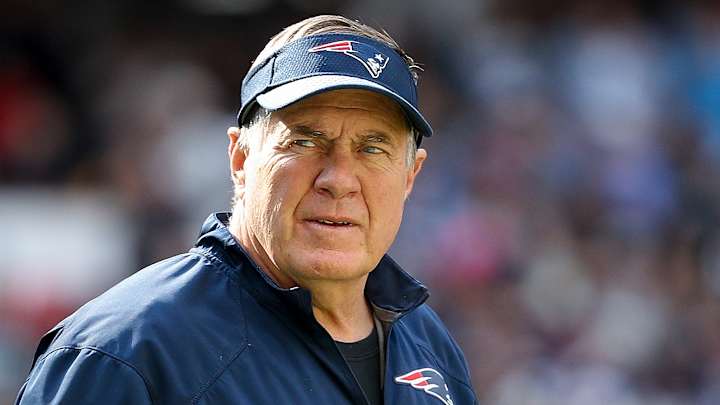Bill Belichick Gave a Very Detailed Explanation of the Punt Protector
It's hard to get Bill Belichick to say a lot. But he got talking on the role of the punt protector on Friday.

It's hard to get Bill Belichick to say a lot.
But he really enjoys the bizarre minutia of special teams. The latest evidence? He spoke a full 683 words on the role of the punt protector on Friday.
He was asked about the punt protector role after Nate Ebner was placed on injured reserve.
He responded with quite the answer. Deep breath.
"Yeah, that's one of the toughest spots to play. It doesn't come up every play. I'm not saying it's - it's kind of like playing quarterback, but you play quarterback for, call it 60 plays a game, 70 plays a game. You only punt five to 10 times, let's call it - somewhere in there. But, there's a lot of different variables. You know, if it's eight-on-eight, then it's getting the right eight-on-eight. Now, if you split your gunners out and a guy comes in from the outside, now they have nine-on-eight, and that creates some problems. You also want to try to be able to maximize your coverage, so let's say there's only six guys rushing and you have eight blockers, right - seven plus the personal protector. If you can block those six with six and then have two free guys going to the ball, particularly if it's the two guys that are your best coverage players or two of your best coverage players, there's some strategy there, too. So, identifying the rush, identifying the return - sometimes you can tell what the return is based on the way they align - or if there's a double team on the gunner or not a double team on the gunner, a lot of times the wind plays into that. Sometimes the situation plays into it. Teams that like field returns are bound to return in certain situations, or middle returns in certain situations, like plus-50, things like that. So, there are a lot of variables there, but a good personal protector takes all those into consideration, just like a quarterback does, and A, protect the punter, B, he's the last line of defense. So, a lot of times, even if your protection is not right on the front, if that guy gets the right guy and does the right thing, you still could possibly save a blocked punt by just him doing the right thing, even though somebody else has made a mistake in the front of it. So, that decision making is a key part of it there, and the whole cadence and communication between the snapper, the punter and the gunners if we directional punt - if we're trying to punt the ball one way or the other, making sure that everybody knows where that is and if it changes, which sometimes it does based on the look that they give you. So, there's a lot of different things that go in there. It's not an easy job at all if you want to do it right and get the most out of it. So, we've had a number of guys do that - Pat's done it for us, Jordan's [Richards] done it for us, obviously Nate did a great job of it. Those guys all meet together and work together, just like the quarterbacks do. They all learn the same things so that they all understand what the options are, and what's a good option against one team might be a bad option against another team. It frequently is. We wouldn't always necessarily do it by the book. It would depend on what the look was and who the people are on the other side of the ball, who we're facing. So, the plus-50 punting game where they leave their defense on the field and don't put a punt return team out there, that creates a whole other set of problems that you have to deal with on the punt team. The size and the type of player that's rushing is a lot different than, a lot of times, the player that's on the punt return team and the rushers they would use would be different. So, that creates another element of it, too. A lot goes into that position. It's a tough position to play, as I said. I'm not trying to say it's like playing quarterback. You don't do it 70 times a game, but the times you do it, it could be a team like Buffalo that gives you some different looks, Miami that gives you a lot of different looks. It's challenging."
Belichick has a football mind, and it's cool to see how he processes the intricacies involved. He once spoke 1,039 words on special teams so it makes sense that this follows a similar longer pattern.
Bill Belichick and Special Teams: A Love Story
Until the next lesson, this will have to tide us over.
